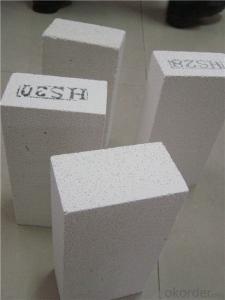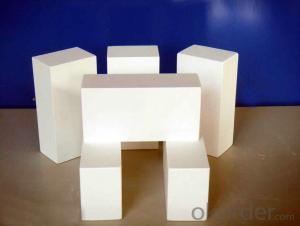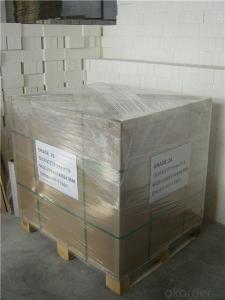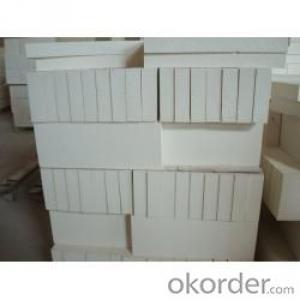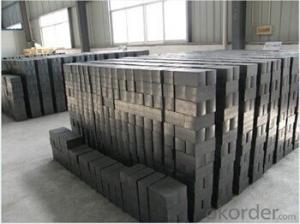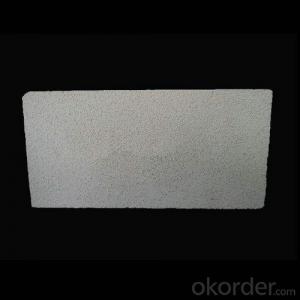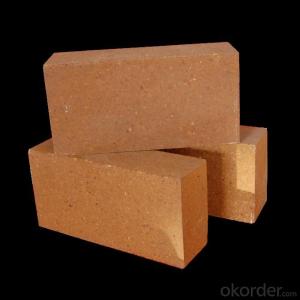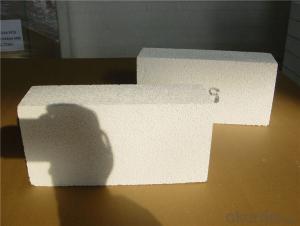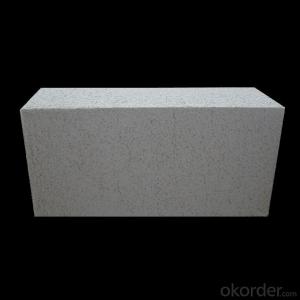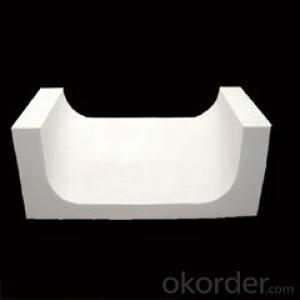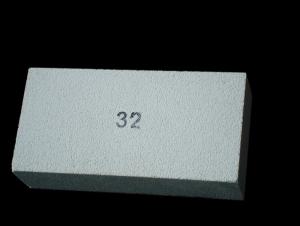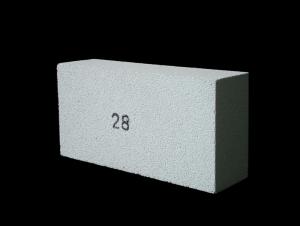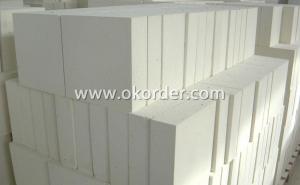Low Weight,Insulating Refractory Products Refractory Bricks
- Loading Port:
- Tianjin
- Payment Terms:
- TT or LC
- Min Order Qty:
- 3 m.t.
- Supply Capability:
- 1000 m.t./month
OKorder Service Pledge
OKorder Financial Service
You Might Also Like
Thermal Insulation Fire Clay Brick
CNBM conforms strictly to the requirements of ISO 9000 quality control system during the production. MSDS is also available if you want. The thermal insulation fire clay brick meet with the requirements of ASTM & JIS standards. So please stay cool with our quality.
Application
Insulating Fire Brick are used for the lining of converter, alternating current arc furnace, direct Current arc furnace and the ladle slag line, etc.
Company Advantage
(1)Long Insulating Fire Brick manufacture history: 25 years manufacturer
(2)Advanced equipment
(3)Diversification of production standards: ISO ANSI FEPA JIS ASTM
(4)Flexible payment: T/T L/C D/P D/A
(5)Professional marketing team and after-sale service
(6)Free sample
Insulating Fire Brick main feature:
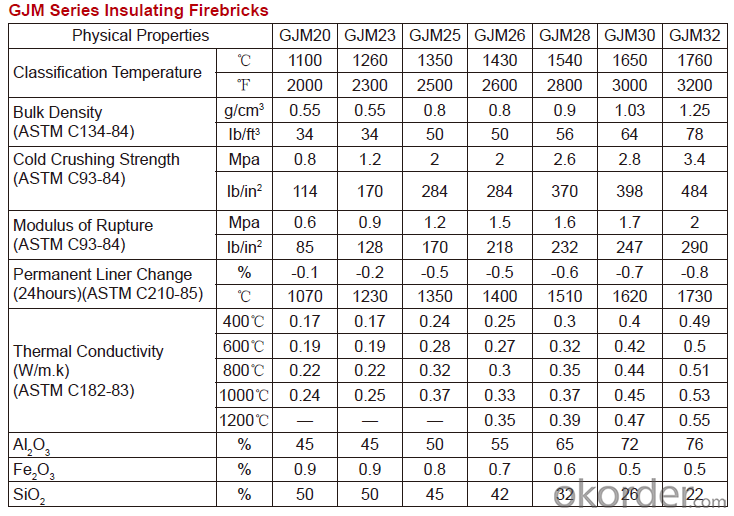
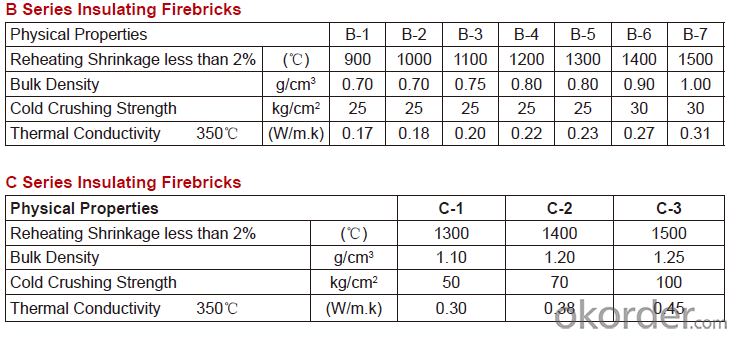
Equipment
1 unit of Ceramic Abrasive (SG Abrasive) pilot production line
2 units of Compact grain Abrasive pilot production lines
1 unit of high-end coated abrasives (abrasive cloth) production line
2 units of Boron Carbide production lines
3 large flexible crushing and sieving lines for grit production lines
2 units of 2000KVA furnaces for Boron Carbide fusion
6 units of 5000KVA-10000KVA dumping type electric arc furnaces for Brown Fused Alumina fusion
FAQs
Q1 What’s the transport method?
A1 FCL delivery goods with wooden pallet or wooden case by sea; If LCL delivery, must with wooden case; Sometimes need open top, flat rack or bulk cargo.
Q2 What’s the required payment term?
A2 Generally 30% TT as the prepayment, 70% TT before delivery. If need, 100% Irrevocable Letter of Credit or negotiation.
Q3 Which country are our products exported to?
A3 Apart from entire Chinese market, the US, Russia, Japan, Korea, Australia and some Southeast Asian Nations.
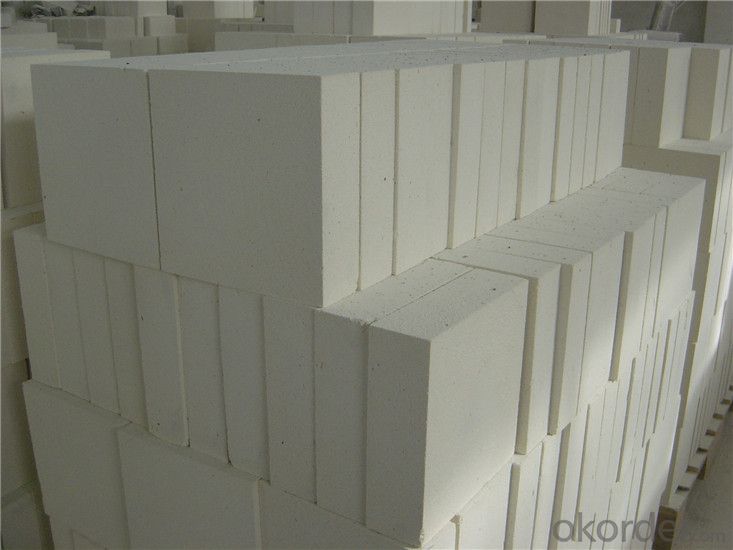
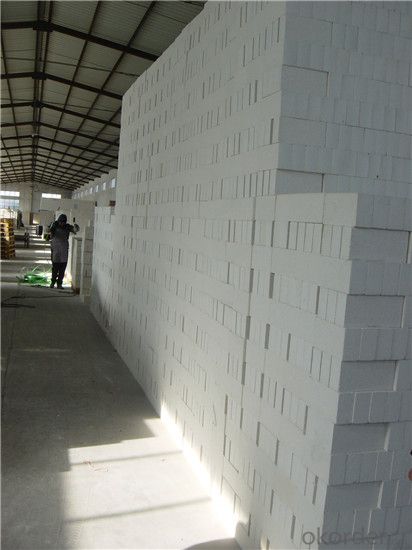
- Q:What is the average density of insulating fire bricks?
- The average density of insulating fire bricks can vary depending on the specific composition and manufacturing process. However, in general, insulating fire bricks have a lower density compared to regular bricks. The average density of insulating fire bricks typically ranges from 0.6 grams per cubic centimeter (g/cm³) to 1.5 g/cm³. This lower density is achieved by incorporating lightweight materials or by introducing air pockets during the manufacturing process. The lower density of insulating fire bricks allows them to provide excellent thermal insulation properties, making them ideal for applications where high temperatures need to be contained while minimizing heat loss.
- Q:Can insulating fire bricks be used in the construction of glass melting furnaces?
- Insulating fire bricks are indeed applicable for constructing glass melting furnaces. These bricks are specifically designed to possess exceptional heat resistance and endure exceedingly high temperatures. Their low thermal conductivity allows for efficient heat retention and minimal heat loss. In glass melting furnaces, where temperatures can reach up to 1600°C (2912°F) or even higher, insulating fire bricks serve a pivotal role in maintaining the desired temperature within the furnace. By utilizing these bricks as the lining for the furnace, the heat generated during the melting process can be effectively contained, resulting in improved energy efficiency and reduced heat loss. Additionally, insulating fire bricks are lightweight and exhibit remarkable thermal shock resistance, making them highly suitable for glass melting furnaces that experience sudden temperature fluctuations. This ensures that the bricks will not crack or break under the extreme conditions present in the furnace. Overall, incorporating insulating fire bricks into the construction of glass melting furnaces offers superior insulation, energy efficiency, and durability, rendering them an ideal choice for this application.
- Q:Can insulating fire bricks be used as a refractory material?
- Insulating fire bricks can indeed serve as a refractory material, given their specific design for enduring high temperatures and thermal shock. These bricks prove suitable for situations necessitating heat insulation and refractory properties. By virtue of their low thermal conductivity, they effectively diminish heat loss and conserve energy. Industries such as steel, glass, ceramics, and petrochemicals frequently employ insulating fire bricks as lining materials within furnaces, kilns, ovens, and other equipment operating at elevated temperatures. The combination of their capacity to withstand extreme temperatures and insulating characteristics renders them an outstanding option for refractory applications.
- Q:What is the difference between insulating fire bricks and regular fire bricks?
- Insulating fire bricks are designed to have lower thermal conductivity, allowing them to retain heat more effectively and prevent heat loss. Regular fire bricks, on the other hand, have higher thermal conductivity as they are primarily used for structural purposes and to withstand high temperatures.
- Q:Are insulating fire bricks suitable for insulation in boilers for steam generation?
- Yes, insulating fire bricks are suitable for insulation in boilers for steam generation. These bricks have excellent thermal insulation properties, high heat resistance, and low thermal conductivity, making them ideal for reducing heat loss and improving the energy efficiency of boilers. Additionally, their lightweight and durable nature allow for easy installation and long-term performance in high-temperature environments.
- Q:Can insulating fire bricks be used in the construction of hot water boilers?
- Yes, insulating fire bricks can be used in the construction of hot water boilers. These bricks are designed to withstand high temperatures and provide excellent insulation, making them suitable for applications such as hot water boilers where heat retention is crucial.
- Q:Are insulating fire bricks suitable for use in heat exchangers?
- Depending on the specific requirements and conditions of the heat exchanger application, insulating fire bricks can be considered as a suitable option. These bricks possess exceptional thermal insulation properties, low thermal conductivity, and a remarkable ability to withstand high temperatures. As a result, they effectively minimize heat loss and conserve energy within heat exchanger systems. Moreover, insulating fire bricks are lightweight and possess good mechanical strength, allowing for convenient installation and maintenance. They are also resistant to thermal shock and chemical corrosion, guaranteeing durability and longevity even in harsh operating environments. Nevertheless, it is important to acknowledge that insulating fire bricks may not be appropriate for all heat exchanger applications. In instances where efficient heat transfer necessitates high thermal conductivity, alternative materials with greater thermal conductivity should be taken into consideration, particularly in certain industrial heat exchangers. Ultimately, the suitability of insulating fire bricks in heat exchangers relies on specific factors such as the operating conditions, design requirements, and performance expectations of the system. Therefore, it is advisable to consult experts or engineers well-versed in heat exchanger design and materials to determine the most suitable choice for a particular application.
- Q:Can insulating fire bricks be used for insulation in petrochemical plants?
- Yes, insulating fire bricks can be used for insulation in petrochemical plants. Insulating fire bricks have high thermal resistance and can withstand high temperatures, making them suitable for insulation in petrochemical plants where heat containment is crucial.
- Q:What is the specific heat capacity of insulating fire bricks?
- The specific heat capacity of insulating fire bricks can vary depending on the specific composition and manufacturing process of the bricks. However, in general, insulating fire bricks have a relatively high specific heat capacity compared to other types of bricks. This means that they are able to absorb and store a significant amount of heat energy without undergoing a large increase in temperature. The specific heat capacity of insulating fire bricks typically ranges between 0.8 and 1.2 kilojoules per kilogram per degree Celsius (kJ/kg°C). It is worth noting that the specific heat capacity may also be influenced by factors such as the density and porosity of the bricks, as well as the temperature range in which they are being used.
- Q:Can insulating fire bricks be used in refractory castings?
- Yes, insulating fire bricks can be used in refractory castings. These bricks are designed to have low thermal conductivity, making them suitable for applications where high insulation is required, such as in refractory castings. They provide excellent heat insulation and can withstand high temperatures, making them an ideal choice for various refractory applications.
1. Manufacturer Overview |
|
|---|---|
| Location | |
| Year Established | |
| Annual Output Value | |
| Main Markets | |
| Company Certifications | |
2. Manufacturer Certificates |
|
|---|---|
| a) Certification Name | |
| Range | |
| Reference | |
| Validity Period | |
3. Manufacturer Capability |
|
|---|---|
| a)Trade Capacity | |
| Nearest Port | |
| Export Percentage | |
| No.of Employees in Trade Department | |
| Language Spoken: | |
| b)Factory Information | |
| Factory Size: | |
| No. of Production Lines | |
| Contract Manufacturing | |
| Product Price Range | |
Send your message to us
Low Weight,Insulating Refractory Products Refractory Bricks
- Loading Port:
- Tianjin
- Payment Terms:
- TT or LC
- Min Order Qty:
- 3 m.t.
- Supply Capability:
- 1000 m.t./month
OKorder Service Pledge
OKorder Financial Service
Similar products
New products
Hot products
Related keywords
